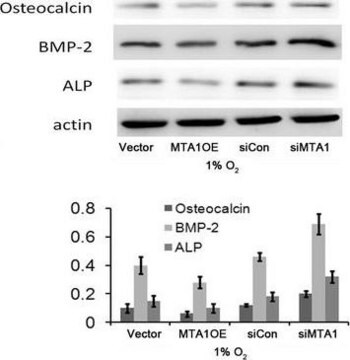AB1870
Anti-Osteopontin Antibody
serum, Chemicon®
Synonym(s):
Uropontin, Bone sialoprotein 1, SPP1/CALPHA1 fusion, Urinary stone protein, bone sialoprotein I, osteopontin/immunoglobulin alpha 1 heavy chain constant region fusion protein, secreted phosphoprotein 1, secreted phosphoprotein 1 (osteopontin, bone sialop
About This Item
Recommended Products
biological source
rabbit
Quality Level
antibody form
serum
antibody product type
primary antibodies
clone
polyclonal
species reactivity
mouse, rat, human
manufacturer/tradename
Chemicon®
technique(s)
ELISA: suitable
immunohistochemistry (formalin-fixed, paraffin-embedded sections): suitable
western blot: suitable
NCBI accession no.
UniProt accession no.
shipped in
dry ice
target post-translational modification
unmodified
Gene Information
human ... SPP1(6696)
Related Categories
General description
Specificity
Immunogen
Application
A previous lot of this antibodu was used at a 1:1500 dilution on paraffin-embedded tissue sections.
ELISA:
A previous lot of this antibody was used at a 1:1000 dilution.
Optimal working dilutions must be determined by end user.
Cell Structure
Osteobiology
Quality
Western Blot Analysis: 1:500 dilution of this lot detected osteopontin on 10 μg of RAW 264.7 lysates.
Target description
Physical form
Storage and Stability
Handling Recommendations:
Upon first thaw, and prior to removing the cap, centrifuge the vial and gently mix the solution. Aliquot into microcentrifuge tubes and store at -20°C. Avoid repeated freeze/thaw cycles, which may damage IgG and affect product performance.
Analysis Note
POSITIVE CONTROL: Human urine (2-5 µg/mL normal concentration).
Other Notes
Legal Information
Disclaimer
Not finding the right product?
Try our Product Selector Tool.
Storage Class Code
10 - Combustible liquids
WGK
WGK 1
Flash Point(F)
Not applicable
Flash Point(C)
Not applicable
Certificates of Analysis (COA)
Search for Certificates of Analysis (COA) by entering the products Lot/Batch Number. Lot and Batch Numbers can be found on a product’s label following the words ‘Lot’ or ‘Batch’.
Already Own This Product?
Find documentation for the products that you have recently purchased in the Document Library.
Our team of scientists has experience in all areas of research including Life Science, Material Science, Chemical Synthesis, Chromatography, Analytical and many others.
Contact Technical Service







